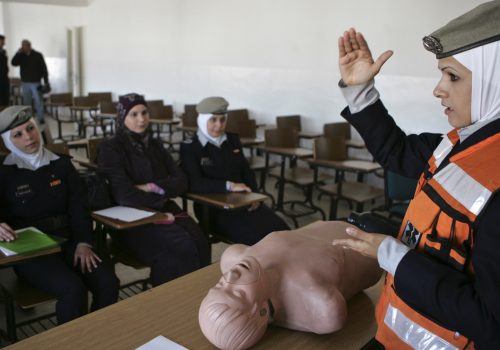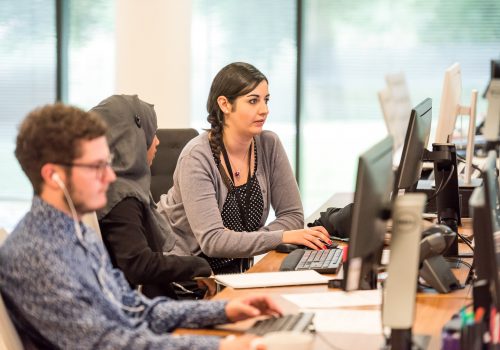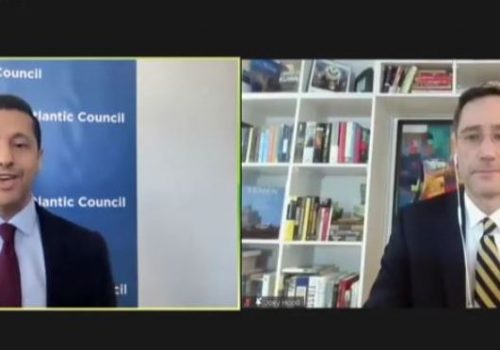Princess Reema tells Saudi women entrepreneurs to dream big
On June 23, 2021 the Atlantic Council’s empowerME Initiative held a workshop featuring a keynote fireside chat with Saudi Ambassador to the United States, Her Royal Highness Princess Reema Bint Bandar Al Saud, which was moderated by US Embassy Riyadh Chargé D’Affaires Martina Strong, and a panel discussion with Endeavor Saudi Arabia Managing Director Lateefa Alwaalan, 500 Startups MENA Partner Amal Dokhan, S&P Global Chief Public & Government Affairs Officer Courtney Geduldig, and UPS Vice President for Community Relations Esther Ndichu, which was moderated by empowerME Director and Resident Senior Fellow Amjad Ahmad.
This workshop was part of the Igniting Women’s Entrepreneurship and Innovation in Saudi Arabia program and was led by the Atlantic Council’s empowerME Initiative in partnership with the US Mission to Saudi Arabia, the American Chamber of Commerce Saudi Arabia, and Quantum Leaps. The program is bringing US entrepreneurs, experts, and business leaders together with their Saudi counterparts to build relationships, share knowledge, and develop partnership opportunities via hybrid workshops and networking sessions.
Key takeaways:
Saudi Arabia’s Changing Entrepreneurial Ecosystem
- Amjad Ahmad discussed the importance of more US-Saudi partnerships and knowledge sharing to bring entrepreneurs, business leaders, and experts from both countries together to promote economic prosperity, and added that “Saudi Arabia has embarked on an essential economic transition with a substantial rise in entrepreneurship and with women playing a greater role in the country’s economy.”
- Martina Strong emphasized the United States’ desire to see Saudi women equipped to take full advantage of the rapid pace of change: “In today’s Saudi economy, one can sense the dynamism, the creativity, new sectors and opportunities are being generated and expanded every single day…We want to see many more women take their rightful place of leadership in the economy and across Saudi society.”
- Her Royal Highness Princess Reema Bint Bandar Al Saud emphasized that: “Vision 2030 changed everything…today, when I look at these young female entrepreneurs, the challenge isn’t regulatory anymore. The challenge isn’t really even financial anymore because the opportunities are there for financial development and support and growth. Mentorship is available. The limitation today is your dream.” She added that Vision 2030 has unlocked so many opportunities for women to not just dream but bring their dreams to fruition. “That is the profound difference” from the past, she said, and it is a “fundamental shift.”
- Her Royal Highness Princess Reema Bint Bandar Al Saud also shared an anecdote illustrating the rapid pace of change in the Kingdom and the importance of timing for a business to be successful. In 2005 when she co-founded Yibreen, a women’s gym chain, she struggled to expand it because of the legal, regulatory, and cultural environment at that time. Then, a few years ago in her role working for the Saudi General Sports Authority, she was asked to deregulate that very same sector, which has enabled women’s gyms to flourish.
- Lateefa Alwaalan noted that “there is a rise of a subsector of women getting into their own businesses enabled by technology, delivery apps, and e-commerce solutions to put their innovative ideas out there and start sourcing.” She added that internet penetration and digital access is also helping.
- Amal Dokhan highlighted the positive funding trajectory in the MENA region and in Saudi Arabia, with the MENA region passing the $1 billion funding mark in 2020 even amidst the COVID-19 pandemic. She added that Saudi Arabia had $156 million in startup funding in 2020 and there was a 56 percent increase in startup funding in 2021 year-to-date. These trends are positive and demonstrate investor interest, Dokhan added.
Challenges for Women Entrepreneurs & Strategies to Address Them
- Her Royal Highness Princess Reema Bint Bandar Al Saud discussed an ongoing challenge for women entrepreneurs: access to funding. She noted that this is an issue not just in Saudi Arabia but worldwide, since there have been more men than women entrepreneurs historically, meaning that investors are more accustomed to funding men entrepreneurs. She urged women entrepreneurs to get advice and support on structuring and running their business to ensure their endeavors are competitive and viable.
- Her Royal Highness Princess Reema Bint Bandar Al Saud emphasized the importance of financial literacy and financial security for all women entrepreneurs to ensure that financial insecurity does not become a significant stress factor that derails a business endeavor.
- Lateefa Alwaalan noted that, while more and more women are launching businesses, scaling and turning them into a sustainable venture is a challenge. Courtney Geduldig expanded on this point, stating that there has been a 72 percent increase in companies founded by women in the past few years, but scaling is not happening at the same rate in part because more venture capital funding goes to men. According to Geduldig, getting more women into venture capital firms will help address this issue since gender diversity brings diversity of thought no matter the field.
- When asked about the percentage of women founders in the region, Amal Dokhan stated that approximately 14 percent of the MENA startups are women-led. She emphasized that there is not a lack of women entrepreneurs and that there are more and more every day, but there is a need for more women-led technology startups. According to a 2019 report, 16 percent of startup founders in Saudi Arabia are women.
- Courtney Geduldig shared findings from research for her book: Where the Jobs Are: Entrepreneurship and the Soul of the American Economy. Challenges she discovered for women entrepreneurs in particular include: lack of financial literacy, lack of confidence, difficulties finding access to funding and access to loans, and the heavy burden of caregiving responsibilities. Geduldig emphasized that these challenges are ongoing in the United States and it would be prudent for us all to learn lessons from other countries working to address these issues. She added that there is a need for more access, guidance, and support focused on opening doors and creating a more inclusive network for women business founders.
Programs to Support Women Entrepreneurs
- Her Royal Highness Princess Reema Bint Bandar Al Saud directed women entrepreneurs to visit the Saudi Ministry of Commerce and the General Authority for Small and Medium Enterprises (Monshaat) websites for further resources on funding opportunities for their businesses.
- Esther Ndichu pointed to corporate programs such as UPS’s work with the American Chamber of Commerce in Saudi Arabia, UPS’s recently signed memorandum of understanding with the Saudi General Authority for Small and Medium Enterprises (SME) (Monshaat) to promote and engage with SMEs in Saudi Arabia, and UPS’s partnership with the International Trade Center’s SheTrades Initiative, to provide channels for women entrepreneurs around the world to access global markets. She discussed UPS’s approach to promoting SME growth around the world through three focal areas: (1) capacity building to close the gap to ensure women entrepreneurs have the skills to access global markets, such as factoring in real costs, (2) market access to bring in private sector partners, and (3) providing logistics perspectives to governments to ensure that the MENA countries’ legal and regulatory frameworks encourage women to become entrepreneurs.
Advice for Women Entrepreneurs
- Her Royal Highness Princess Reema Bint Bandar Al Saud encouraged women entrepreneurs to:
- Take public speaking and debate classes and get advice from experts on core business competencies in areas where they are weak. She also challenged would-be entrepreneurs to make the case for why they are the best person to take the idea forward since having a great idea is not enough.
- Move forward despite rejections and recognize that rejections and “nos” from funders help hone a business idea.
- Get a job in the industry related to their business idea and learn from a person in the field and develop their concept from there.
- Amal Dokhan urged women entrepreneurs to look at the gaps and find a team that complements their capabilities and ask themselves if the market for their idea is big enough to scale and has enough customers. “It’s about finding the right formula,” she added.
- Amal Dokhan also underscored the importance of having the courage to speak in public and share success (and failure) stories: “I meet female entrepreneurs in different parts of the world, but something repeated in every culture is that we don’t want to be out there until we are absolutely perfect. If you get the chance, allocate maybe four times a year, every quarter, to get out there and share your story, or at least offer mentorship.” She added that storytelling is critical and makes you a role model for other would-be women and men entrepreneurs and mentoring is a great way to give back and help the next generation.
- Lateefa Alwaalan emphasized the importance of surrounding yourself with the right networks because those can be enablers that help an entrepreneur find success faster. She added that it is wise to build a team of co-founders and co-investors rather than going it alone, saying: “You will face roadblocks and it is good to find people smarter than you or those who complement you to help you on this journey.”
- Courtney Geduldig shared that one learning from her research with women entrepreneurs and entrepreneurs in general is that they need to find opportunities for mentorship, relationship building, and insider knowledge in order to obtain not just access to finance and credit, but to leverage that access and build on it successfully.
- Esther Ndichu urged women entrepreneurs to check out UPS’s Women Exporter’s Program, which provides information and builds capacity for women-led SMEs. She added that UPS has found that, in the age of tech and ecommerce, businesses can leapfrog the normal process of distribution only in the local community and go straight to global product distribution.
Poll Results
At the workshops, we polled attendees on the following questions related to women’s entrepreneurship in Saudi Arabia. As the results below indicate, the environment for women entrepreneurs in Saudi Arabia is improving, but more access to support and training is still needed.
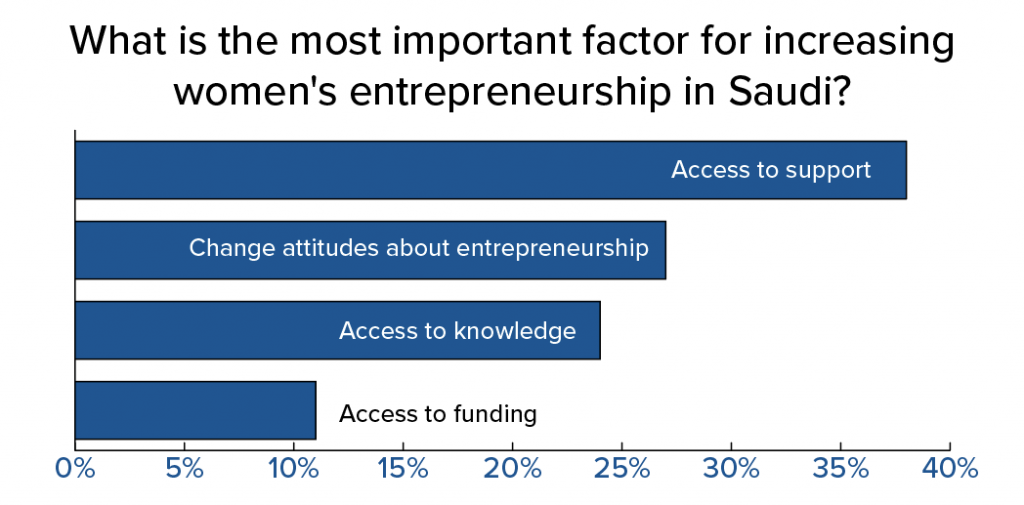
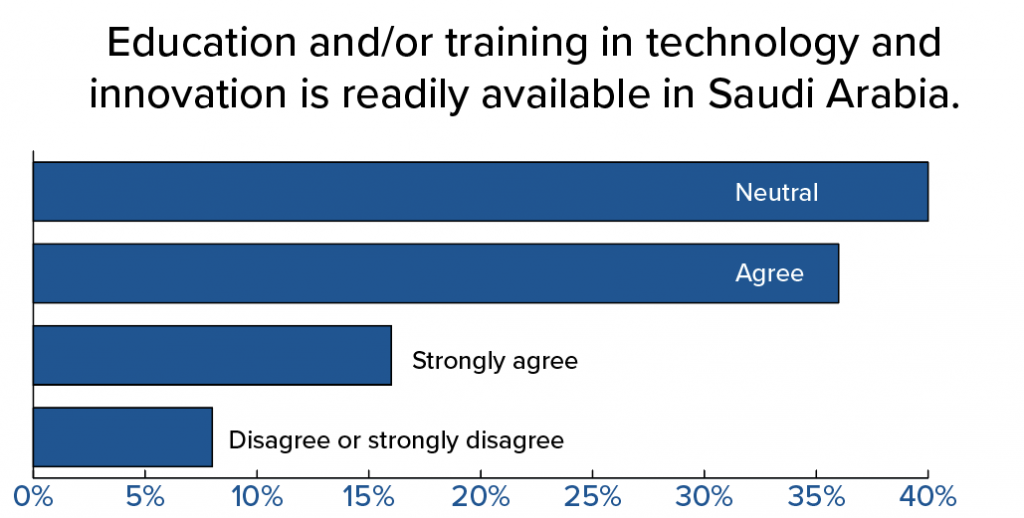
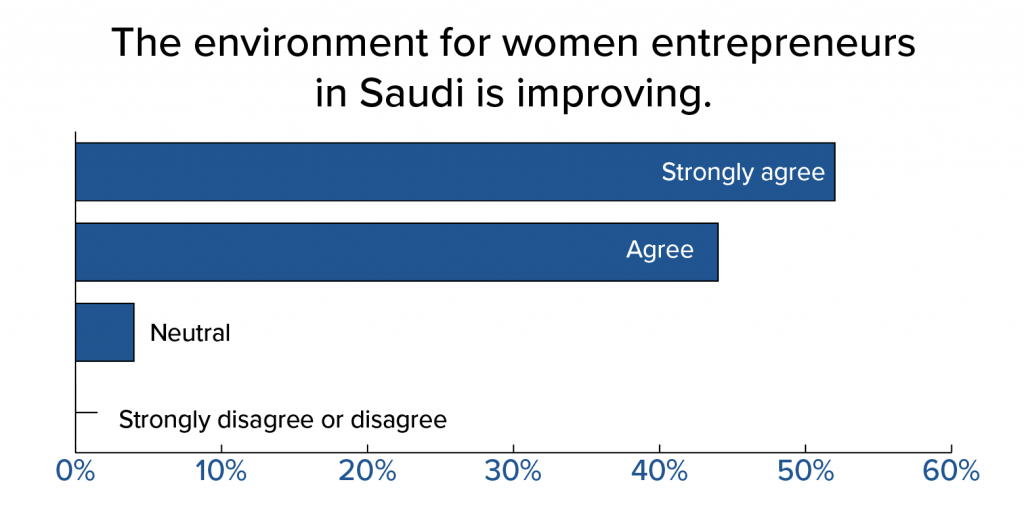
Stefanie H. Ali is deputy director of the Atlantic Council’s empowerME Initiative. Follow her @StefHausheer.
